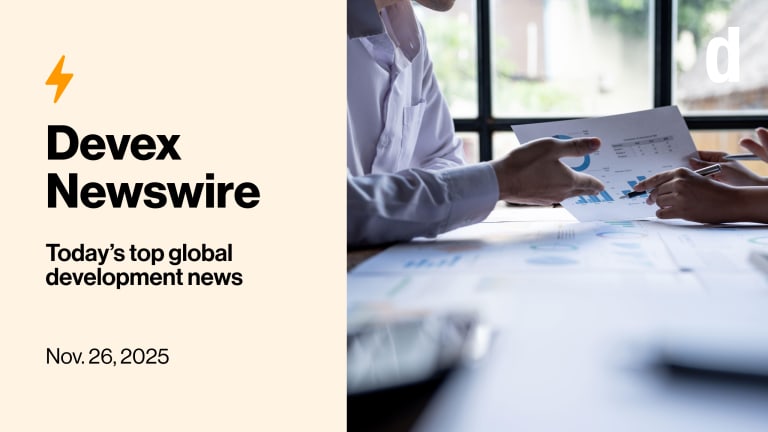Presented by International Monetary Fund

A U.S. indictment alleges HIV test kits were stolen from the Kenya Medical Supplies Authority and resold abroad. While the details of the investigation are slim, the case does give greater insight into the events happening behind the scenes during a period of fraught ties between USAID and the Kenyan agency.
Also in today’s edition: What did we learn at the Labour Party conference? Plus, a look at digital infrastructure, John Kerry on climate, and a look at the new EAT-Lancet report.
+ How does MSD — known as Merck & Co in the U.S. and Canada — structure its global impact work, and what are the opportunities for collaboration? On Tuesday, Oct. 7, we’ll be hosting a Devex Pro Funding Briefing with MSD Foundation President Allison Goldberg and Head of MSD for Mothers Jacquelyn Caglia to find out. Register now.
Hot commodities
An indictment from the U.S. District Court of South Carolina alleges Kenyan national Eric Ndungu Mwangi and his company, Linear Diagnostics, “systematically stole” HIV test kits and other USAID-funded commodities from the Kenya Medical Supplies Authority, or KEMSA.
Between 2015 and 2019, Mwangi allegedly sold the goods to Guyanese national Davendra Rampersaud and his company, Caribbean Medical Supplies, who paid him more than $177,000. Rampersaud then allegedly resold them under a “lucrative, sole-source” contract with the Guyana Ministry of Health.
Mwangi was arrested in Kenya in 2021 and still awaits trial. On the separate U.S. charges, he faces up to 20 years in prison. Rampersaud was arrested in Miami in 2023, pled guilty to conspiracy and stealing health commodities, and received time served, three years’ supervised release, and an $84,000 fine.
While the charges don’t implicate KEMSA, they are the latest development to come to light in years of strain between USAID and the Kenyan agency. USAID ended a contract with KEMSA and initially turned to American company Chemonics to deliver its donated products. That sparked a bitter standoff in Kenya in 2021, leading to a temporary shortage of HIV drugs stuck at the port of Mombasa.
At home, KEMSA has faced turmoil. Following allegations that the agency misused COVID-19 funds, a report from Kenya’s auditor-general in 2020 found “possible fraud.” President William Ruto last year fired the public health permanent secretary, suspended the CEO, and dissolved its board following a canceled Global Fund mosquito-net tender. But a Kenyan government committee found that the Global Fund’s “mode of communication and convoluted reporting structure had led to miscommunication, confusion and the creation of silos.” Last year, the agency, which is amid reforms, also denied allegations of widespread mismanagement, financial irregularities, and legal violations from the country’s auditor-general.
Read: The US charges two with theft from USAID Kenya procurement program
+ Listen: For the latest episode of our podcast series, Devex’s Rumbi Chakamba, Sara Jerving, and Andrew Green break down the key global health takeaways from the 80th United Nations General Assembly and look ahead to the World Health Summit.
Big cuts, bigger spin
The U.K. Labour Party’s first conference since its shock aid cuts was all about damage control. Jenny Chapman, the aid minister, tried to show she has a plan.
Her big idea: corporate cash. With the budget £6.5 billion lower by 2028, banks such as HSBC and Lloyds, plus insurance company Aviva, are “interested in this investment,” she said — but wary because “they don’t know how to calculate the risks.” The pitch? Government data and support in emerging markets to convince boards. But Chapman admitted it depends on private finance “on a scale we’ve never managed before.”
David Lammy’s proposed conference on the future of aid has been delayed until “Spring” 2026, and his successor as foreign secretary, Yvette Cooper, barely mentioned aid at all.
Chapman defended the cut to 0.3% of gross national income as “really popular” with voters and blamed NGOs for letting grassroots activism fade: “We have failed on political communication on development over the last ten years.”
The new selling point? Security. Members of Parliament argued aid must be justified as protection against extremism and refugee crises. MP Laura Kyrke-Smith said security fears create “opportunities for development,” while one campaigner quipped even nutrition programs now need to be spun as preventing “child soldiers.”
Campaigners hoping for bolder moves — on debt or “polluter pays” climate finance — were left cold, writes Rob Merrick for Devex. Chapman also confirmed bilateral aid will be slashed, though she promised three-year funding cycles for predictability.
She warned Nigel Farage’s Reform Party would be “catastrophic” for development — but insisted Labour’s own February cuts won’t be repeated. There’ll be “no more surprises.” Probably.
Read: 8 things we learned at the UK Labour Party conference
ICYMI: Beyond aid cuts, 3 major signs the UK is abandoning development (Pro)
Digital roads to inclusion
When 23-year-old chef Dilshad Alam opened a bank account in Delhi, all it took was an app on his phone. Linking it to his number gave him instant access to the Unified Payments Interface, or UPI — India’s digital payments system — letting him send money, pay bills, and get his salary instantly.
He’s one of nearly half a billion Indians brought into the financial system since 2011, thanks to India Stack — a suite of digital tools for ID, payments, and data sharing that together form digital public infrastructure, or DPI. Supporters say DPI could transform development, cutting costs, boosting growth, and helping countries meet the SDGs. “Everybody understands that roads are public goods … [DPI] helps get similar benefits,” says Sanjay Jain of the Gates Foundation.
The results speak for themselves: Bank account ownership in low- and middle-income countries jumped from 42% in 2011 to 75% in 2024. In India, it rose from 25% in 2008 to over 80% in 2023. Women’s account ownership has nearly doubled, governments deliver cash transfers more efficiently, and a 2023 United Nations Development Programme report found DPI could add up to 1.4% to GDP growth.
But risks loom, writes Catherine Davison for Devex. Poorly designed DPI can exclude the 2.6 billion still offline, while AI may widen the gap between countries that can harness it and those that can’t. “Without those safeguards, at best you're risking accidental data leaks … and at worst, you're risking really malicious-intent usages,” warns UNDP’s Robert Opp.
Still, momentum is building. From India to Brazil, Singapore to France, countries are joining the 50-in-5 campaign to share best practices and scale DPI fast. As Liv Marte Nordhaug of the Digital Public Goods Alliance puts it: “It's extremely refreshing to see learnings and best practice sharing and exchanges on a like-minded basis, because that doesn’t happen so often in development.”
Read: How digital public infrastructure has become a vital tool for development (Pro)
+ Curious about the insights that drive global development? Experience Devex Pro with a 15-day free trial. Explore expert analyses, unlock hidden funding opportunities, connect with key players at exclusive events, and access a wealth of knowledge you won’t find anywhere else. Check out some of the content exclusive to Pro readers.
Trillion-dollar transition
“Don’t blame me.” That’s how John Kerry, the former U.S. secretary of state, brushed off President Donald Trump’s fiery U.N. speech that dismissed climate change as “the greatest con job ever.” Speaking in Geneva at the Building Bridges conference, Kerry said, “The speech speaks for itself … All in all, though, I left New York with a real sense of optimism.”
Not because of Trump. The U.S. had just announced plans to pump $625 million into coal, clearing 13.1 million acres for new mining. Kerry’s optimism came from the surge of climate action he saw elsewhere: trillions pouring into renewables, grids, and storage, which he called “the biggest economic transformation since the industrial revolution.”
Other countries are stepping up, writes my colleague Elissa Miolene, who is attending the event. The European Commission just pledged €545 million for Africa’s clean energy push, Denmark now gets over 88% of its net electricity from renewables, and China dominates with 60% of global electric vehicle batteries and 75% of wind farm installations.
Kerry’s warning: if Washington sits out, America risks missing out on a “hell of a lot of money” in the energy transition. “I and those of us pushing for this are not asking for sacrifice,” he said. “Now, we need the power of investability.”
Read: The world is moving ahead on climate — with or without the US, says John Kerry
+ Development finance takes the center stage this month at the World Bank-IMF annual meetings, but will climate be a major talking point or relegated to hushed tones again? Join us on Wednesday, Oct. 8, for a preview of what to expect at the meetings. Register now.
Food fight
Wholly transforming what we eat — and how we produce it — could help save 15 million lives each year and pull the planet back from the brink, says the updated EAT-Lancet Commission report.
But getting there won’t be easy. The overhaul demands nothing less than ditching fossil fuels and rethinking global food systems, writes Senior Editor Tania Karas, who is attending the Stockholm Food Forum.
“Transforming the food system, on the other hand, can cut global emissions by more than half,” said Johan Rockström, co-chair of the commission. The diet it promotes is mostly plant-based, with modest amounts of fish, dairy, and meat. “It’s really not that different than 2019,” added fellow co-chair Walter Willett, referencing the landmark first report.
Yet no country is anywhere close to following what the researchers call a “planetary health diet” — and the pushback from the meat industry and online “mis-influencers” is only growing. This year’s report stresses the importance of justice in order for food systems to actually be sustainable and resilient. As Christina Hicks, a report commissioner, put it: “In this 2025 EAT-Lancet Commission, we specified three human rights that food systems must support to avoid these harms. This was the right to food, the right to a healthy environment, and the right to decent work.”
Read: Planet at risk — new EAT-Lancet report warns food system overhaul is vital
+ For more content like this, sign up to Devex Dish, a weekly newsletter on the transformation of the global food system.
In other news
A federal judge in New York has dismissed a lawsuit accusing the U.N. agency for Palestinian refugees of complicity with Hamas, citing that the agency has immunity from lawsuits as part of the U.N. body. [New York Times]
Superbug infections are now spreading faster than new antibiotics can be developed, creating a “dual crisis” of scarcity and lack of innovative treatments in the drug pipeline. [The Telegraph]
In parts of Kenya, about one-third of children are now acutely malnourished amid climate-driven impacts and recent cuts to foreign aid that have slashed food support, according to Save the Children. [The Independent]
Sign up to Newswire for an inside look at the biggest stories in global development.








